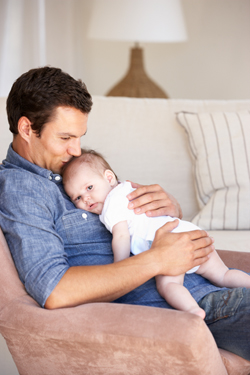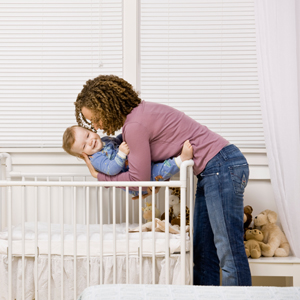Sleep deprivation and parenthood

The words “sleep deprivation” and “parenthood” are intricately linked. It’s a hard fact that when you’re a parent of a newborn or a baby, or even a toddler, that you are going to be sleep deprived at times. For some parents, sleep deprivation may last for years. If you are one of those parents, it can often be difficult to see the light at the end of your sleep-deprived tunnel, but there are ways to cope with and combat sleep deprivation.
As a parent you will usually hear lots of facts about the “average baby” sleeping sixteen and a half hours a day. This figure has been brought about by including babies that sleep 9 hours, and those who will sleep for 21. The fact is, every baby is a unique little individual, and developing regular sleep cycles is something that will take time and patience in resolving. The key is for parents to stop blaming themselves for the fact that their child doesn’t sleep all night or settle well at bedtime.
|
Age |
Typical sleep cycle |
Signs of tiredness |
Typical number of sleeps during day |
|---|---|---|---|
|
0-3 months |
Typically sleep 16-18 hours a day, usually only awake 2 hours at a time |
closing their fists, arching backwards, jerky movements, struggle to focus on faces |
4 or more – these will vary in length from short naps to a couple of hours |
|
3-6 months |
Sleep for around 15-16 hours a day |
As before. Will look specifically for parent’s face to seek comfort. |
2-3 – these will usually be broken down into 2 shorter naps and 1 long one. |
|
6-12 months |
13-14 hours during a 24 hour cycle, broken down into 10-12 hours overnight, and 2 or 3 sleeps during the day of 1-3 hours. |
Clumsiness, grizzling, rubbing their eyes, struggling to engage with anything |
2 – this will usually consist of 1 short nap and 1 long nap in the morning or afternoon. |
|
1-2 years plus |
12-14 hours during a 24 hour cycle. Usually one day-sleep of about 2 hours. |
Impatient, rejects food, irritable, un-cooperative |
1 – this usually lasts for a couple of hours and takes place in the middle of the day. |
Coping with sleep deprivation
Sleep deprivation can feel like torture for parents that are affected by it. There are no hard and fast rules for how to settle your baby and to get them to sleep for extended periods. The thing is, no one will know or understand your baby’s needs like you do. The advantage of this is that you are most likely to know which method of settling them will work best for them. Don’t be afraid to try them all over time. But how do you cope with sleep deprivation and the daily demands of your life?
- Take your time. If you are introducing new settling strategies, give it a decent trial for a few days. This will help to avoid confusion and see objectively if what you are doing is working.
- Don’t be afraid to ask for help! Accept any reasonable offers of support. Even asking someone to hold the baby for you while you shower or have a meal can make a difference.
- Look after your own needs and try not to forget the basics. Showering daily, changing your clothes, eating regular meals, avoiding too much caffeine, and drinking plenty of water will help you feel better.
- Trust your instincts, no matter what they tell you. If you feel there is something wrong with your baby, get them checked by your healthcare professional. Reassurance and support are essential in the early days of parenting. You are not meant to be alone.
- Get out of the house. You may feel shattered, and going outside is the last thing you want to do. But going outside and having a change of scenery often helps parents to feel calmer and change their perspective.
Signs that a baby needs to go to sleep:
Sleep deprivation often makes it harder to recognise when your little one is tired and to figure out the best ways to cope with this. Here are the key signs to watch out for with a baby who is tired:

- Changing facial expressions – relaxed to grimacing
- Frowning and looking unhappy
- Looking away from you or staring into space
- Rigid, jerky or tense arm, hand and leg movements
- Fists clenched
- Rubbing eyes and ears
- Yawning
- Crying, fussing, being unsettled – this is a late clue
What a baby needs to sleep
Bear in mind that most babies aren’t born knowing how to go to sleep and how to stay asleep. You might be one of the lucky few, but most babies will need to be taught and helped with this skill by their parents. During the early months you can work on creating a pattern with your newborn that develops into a routine. The best way to establish a routine is using the Feed / Play / Sleep method.
During the day when baby wakes, feed them first and then place your baby on the floor for some playtime. The age of your baby will determine how long they will play before showing tired signs. Watch for the tired signs and then act on them by implementing the settling techniques.
In the evening, after dinner or a feed, replace play time with a relaxing bath. Have some cuddling time and perhaps a story or two. Massaging your baby with baby lotion can also be very useful for relaxing your baby. Avoid over-stimulating your child before bedtime or think that the longer you keep them up, the more tired they will become and the easier it will be to get them off to sleep. An overtired baby is always harder to settle!
Check that your baby is dressed simply and comfortably for sleep. This includes a dry diaper and clean sheets. Lots of babies tend to sleep better in the dark and cool. Using blinds or dark curtains can really make a difference.

Sleep and settling methods
Swaddling
Swaddling has been found useful by many parents to help their child develop sound sleeping habits. A muslin or a light cotton wrap is all that is needed for new babies. However, larger or more active babies may need a cotton ‘baby’ wrap. If it’s hot you just need to dress baby lightly under the wrap, to avoid overheating.
The safest guidelines for swaddling your baby are:
- Wrapping is a useful strategy that parents can use to help their babies to settle and sleep on their back, especially during the first 6 months of life.
- Wrapping and placing babies on the back provides stability and helps to keep babies in the recommended back position.
- When wrapping baby, allow for hip flexion and chest wall expansion and ensure baby is not overdressed under the wrap, has their head uncovered and does not have an infection or fever.
- Babies must not be wrapped if sharing a sleep surface (including bed-sharing) with an adult.
- Discontinue wrapping baby when baby is able to turn onto tummy during sleep.
Settling in parent’s arms

Small babies often go to sleep when they are being fed or cuddled. For lots of parents, their baby settling in this way it isn’t a problem as long as they stay asleep when they are put into their cot. If this doesn’t happen and baby wakes up and cries, try to interpret their cry as either a genuine need for cuddling or one which is telling you they are just tired and grizzling. This is a learned skill for parents and one which may take some weeks.
Gentle patting, sh-ing, rocking the cot, playing music or singing a lullaby often helps to calm a crying baby. Loving human contact is important for young babies and helps with their brain development.
There will be times when it just works to cuddle your baby until they go to sleep. Small babies need their parents to comfort them when they are unsettled because they do not have the skills to soothe themselves.
Hands-on settling
This is a good mid-way point for babies who are used to being cuddled to sleep but parents are keen for them to learn how to settle in their cot.
Place your baby into their cot, clean, dry, and comfortable, fed though awake and rest your hands gently on them. Rocking, patting, stroking or just leaving your hands gently on their body will be reassuring.
You can stay until they are calm and then leave before they are asleep or alternately, stay until you know your baby is sleeping.
Comfort settling
This is a good way for older babies to go to sleep in their cots more independently. Try leaving the room before your baby is actually asleep and give them a chance to settle on their own.

If your baby cries go back in to them and offer reassurance. Again, listen for their cry and try to interpret if they really need you to go back in to them.
Leaving your tired, older baby to settle on their own is fair and reasonable as long as all of their needs have been met.
There are other options for older babies that are used to having a parent with them to go to sleep.
If you are struggling to cope with sleep deprivation, it is perfectly normal to feel this way. Contact your GP or clinic for information on support groups in your area. You do not have to cope on your own.

